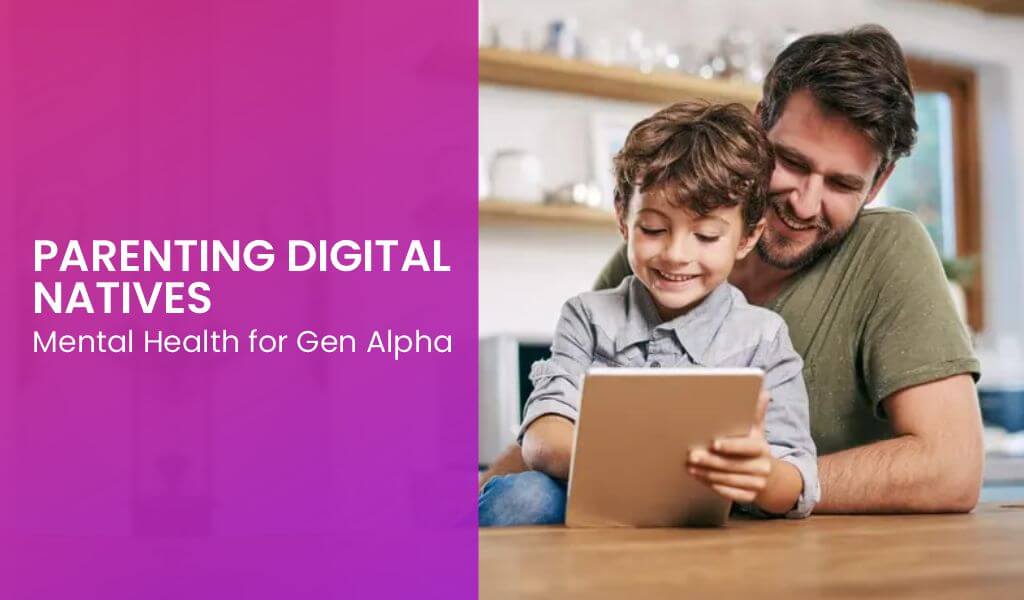
Parenting Digital Natives: Mental Health for Gen Alpha
There’s no denying it—our kids are growing up differently. Generation Alpha, born from 2010 onward, is the first group to live entirely in a digital era. They’ve never known a world without smartphones, social media, or voice assistants. Technology is as normal to them as playgrounds and lunchboxes were to us.
But this constant connection comes with challenges. As screens become central to education, communication, and entertainment, Gen Alpha’s mental health has become a growing concern for parents and educators. The question isn’t whether technology is good or bad—it’s how we guide our children to use it in healthy ways.
This article explores what it means to parent digital natives, how online exposure impacts mental health, and what practical steps parents can take to support Gen Alpha’s emotional well-being in a connected world.
1. Understanding Gen Alpha: The True Digital Natives
Before we talk about mental health, it’s important to understand who Gen Alpha really is. These kids are digital from birth. Tablets replaced storybooks early on, YouTube is their TV, and video games are their main form of socializing.
Unlike previous generations, their learning, friendships, and even creativity are shaped through screens. According to a Common Sense Media report, children between the ages 8–12 spend nearly 5 hours a day on screens, not counting schoolwork.
That kind of exposure influences how they process information and interact with the world. They’re quick learners, visually oriented, and often more tech-savvy than their parents. But it also means they face pressure to stay constantly connected and validated online—something many adults still struggle with.
Personal Insight:
A mother of two Gen Alpha kids recently shared, “My 10-year-old doesn’t just want to play Minecraft—he wants to record it, edit it, and upload it to YouTube. I love his creativity, but it’s hard to know where to draw the line.”
That “line” is what modern parenting is all about—balancing tech freedom with mental health boundaries.
2. The Hidden Impact of Screen Time on Mental Health
Screen time is often the biggest battleground in Gen Alpha households. But it’s not just about the hours spent online—it’s about how that time is spent.
Too much passive screen time (like endless scrolling or watching videos) has been linked to anxiety, shorter attention spans, and poor sleep. But interactive screen time—like creating art, coding, or learning online—can actually strengthen problem-solving and confidence.
The real issue lies in overexposure. When kids rely on screens for emotional comfort or social validation, it can affect their ability to regulate emotions and build self-esteem offline.
According to research from the American Psychological Association, social media exposure before age 13 can increase risks of depression and body image issues. Yet, cutting screens out completely isn’t realistic—or helpful. Instead, parents can teach mindful use.
Tip: Encourage tech breaks. For example, make mealtimes screen-free or set “offline hours” before bedtime. This helps kids reconnect with real-world activities and improves sleep quality.
3. Social Media Pressure: Growing Up in the Spotlight
For many Gen Alpha children, social media isn’t a future challenge—it’s already part of their lives. Platforms like YouTube, Roblox, TikTok, and even Instagram shape how they see themselves and others.
Unlike millennials, who adopted social media as teens, Gen Alpha is growing up inside it. Their friendships, hobbies, and even self-worth can be influenced by likes and follows.
This creates a constant need for comparison. Seeing filtered perfection at such a young age can lead to feelings of inadequacy. Many kids feel pressure to be “camera-ready” or to measure their value through engagement.
Example:
A teacher once noted how her students worried more about how their school projects looked online than about what they learned from them. This shows how deeply digital validation affects motivation and self-esteem.
Parental Approach:
Parents can’t fully shield children from this, but they can teach perspective. Talk openly about how social media highlights only the best parts of life. Share your own examples of online and offline balance. And most importantly, model the behaviour—kids learn far more from what we do than what we say.
4. Building Emotional Resilience in a Digital World
Parenting digital natives means teaching resilience not only for the physical world but also for the digital one. Emotional resilience is the ability to recover from setbacks, criticism, or online pressure—and it’s a skill that can be learned.
Here’s how parents can nurture it:
- Encourage open conversations. Make sure your child feels safe talking about online experiences, especially negative ones.
- Validate feelings. If your child feels left out after seeing friends’ posts, acknowledge those emotions instead of dismissing them.
- Teach problem-solving. Guide them to think critically—what can they do next time to feel better or handle a similar situation differently?
- Model healthy coping mechanisms. Instead of scrolling when stressed, show other ways to unwind—like walking, reading, or talking.
Personal Example:
One family introduced a weekly “digital detox hour” where everyone unplugs and does something creative together—painting, cooking, or playing board games. The kids initially resisted, but soon started suggesting activities themselves. It became a fun family tradition that strengthened the connection.
Resilience grows when kids feel supported and heard, not lectured or controlled.
5. Balancing Technology with Real-World Connection
Technology is not the enemy. In fact, it offers incredible opportunities for learning, creativity, and global awareness. The goal is to balance digital engagement with offline experiences that nurture empathy, confidence, and focus.
Here are a few ways to achieve that balance:
- Set healthy screen boundaries. Use parental tools wisely—not to control, but to guide.
- Encourage outdoor play. Time in nature has proven mental health benefits.
- Promote real-world social interaction. Arrange playdates, sports, or creative clubs.
- Lead by example. Limit your own screen time when around kids. They notice more than you think.
Keyword insight: Parenting digital natives is not about restricting technology but redefining how it’s used. When parents create environments that value both digital literacy and emotional intelligence, children thrive in both spaces.
6. Supporting Mental Health Through Routine and Awareness
Routine is an underrated mental health tool, especially for Gen Alpha. With so much information and stimulation, consistency helps kids feel grounded.
- Set regular sleep schedules. Blue light from devices can delay sleep, affecting mood and focus.
- Encourage mindfulness. Simple breathing or journaling practices can teach emotional awareness.
- Monitor emotional cues. Changes in appetite, behaviour, or social interest might signal stress or digital fatigue.
- Normalize mental health talks. Make it okay to discuss emotions just like physical health.
Some parents find it helpful to check in weekly—not just “How was your day?” but “How did you feel about your day?” This subtle shift opens honest dialogue.
If a child shows persistent anxiety, withdrawal, or irritability, it may be time to involve a school counsellor or mental health professional. Seeking help isn’t a weakness; it’s a form of modern parenting strength.
7. Preparing for the Future: Parenting in an Evolving Digital Age
The digital world is evolving faster than any generation before it. AI learning tools, VR classrooms, and interactive games will shape the next decade of childhood.
Parents can stay ahead by staying involved—not just supervising, but participating. Play the games they love, ask about their favourite creators, and learn about the apps they use. Understanding their world helps you guide it, not fight it.
Schools are also stepping up with digital literacy programs, but home remains the first place kids learn balance. By creating open communication, emotional safety, and shared digital experiences, parents can help Gen Alpha grow into healthy, confident digital citizens.
Conclusion: Guiding Digital Natives Toward Mental Well-Being
Parenting digital natives means more than managing screen time. It’s about shaping relationships with technology that support—not harm—mental health. Generation Alpha will live in a world where online and offline realities merge, but with mindful parenting, they can learn to thrive in both.
The best thing parents can do is stay connected—emotionally, not just digitally. Listen, guide, and grow with them. Technology will keep changing, but the need for empathy, communication, and balance never will.
If you’re a parent navigating this new world, start small. Introduce tech-free family moments, talk openly about online experiences, and make mental health a shared priority. The goal isn’t to raise perfect digital natives—it’s to raise emotionally healthy, self-aware, and compassionate humans ready for the future.
Related Posts
Ways to Support a Loved One Experiencing Emotional Trauma
Emotional trauma can leave lasting scars that aren’t always visible. Whether it stems from a…
Conscious Polyamory & Ethical Non-Monogamy: Modern Relationship Paradigms
Conscious Polyamory & Ethical Non-Monogamy: Modern Relationship Relationships are changing. More people today are questioning…
Remote Work Burnout: Future-Proof Strategies for Digital Professionals
Remote Work Burnout: Future-Proof Strategies for Digital Professionals Remote work has transformed the way we…
Shifting Mindsets for Success: 10 Proven Ways to Shift Your Mindset Today
10 Proven Ways to Shift Your Mindset Today Success often begins long before you see…









